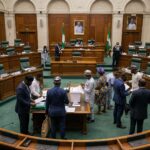Defining Statutory Delegates and the Context of Nigerian Party Primaries
In the intricate landscape of Nigerian politics, political parties serve as the primary vehicles for individuals seeking elective office, given the constitutional absence of independent candidacy. Within these parties, the process of selecting candidates for general elections is a critical stage, often conducted through primary elections. A key element of many party primaries in Nigeria is the delegate system, an indirect method where designated party members cast votes to nominate candidates. This system concentrates the power of candidate selection within a smaller group, raising important questions about the representativeness and potential vulnerabilities of this process.
Among the delegates who participate in these primaries are statutory delegates. These individuals hold a unique position as they are automatically granted delegate status by virtue of their past or present public office within a political party. This category encompasses a broad spectrum of individuals, ranging from the highest echelons of government to local council representatives. The inclusion of statutory delegates in the primary process has become a subject of considerable debate, particularly against the backdrop of criticisms surrounding the fairness and transparency of delegate-based elections in Nigeria, where issues such as vote buying and other forms of corruption have been frequently reported. Understanding the definition, legal framework, and the potential advantages and disadvantages of their participation is crucial for evaluating their impact on the integrity and democratic nature of Nigerian party primaries.
Who are Statutory Delegates in Nigeria?
Statutory delegates in Nigeria’s political parties are defined by the specific public offices they hold or have held. This automatic inclusion in the delegate pool grants them a distinct role in the selection of party candidates. The categories of individuals who qualify as statutory delegates are extensive and span across various levels of government and party structures.
These key categories include former and current Presidents and Vice Presidents, individuals who have occupied the highest executive offices in the nation. Similarly, current and former Governors and Deputy Governors of the states also hold the status of statutory delegates. At the federal legislative level, all members of the National Assembly, comprising both Senators and members of the House of Representatives, are statutory delegates. Given that the National Assembly has 469 members (109 Senators and 360 members of the House of Representatives), this constitutes a substantial voting bloc in national-level primaries. Members of the State Houses of Assembly also fall under the category of statutory delegates, representing the legislative arm at the sub-national level.
Furthermore, key figures within the political parties themselves are also statutory delegates. This includes political party chairmen at the national, state, and local government levels. At the local government level, the chairmen and their deputies are statutory delegates, as are ward councilors, who represent the smallest political units. Finally, members of the National Working Committee (NWC) of the political parties are also included in the list of statutory delegates.
The composition of statutory delegates is significant as it predominantly comprises individuals who currently hold or have previously held positions of authority and influence within the political system. This suggests that statutory delegates are likely to possess a deep understanding of the party’s operations and may have established interests in the outcomes of primary elections. Their embeddedness within the party structure could be seen as both a strength and a potential weakness, as it brings experience to the process but also raises concerns about potential biases and the reinforcement of existing power dynamics.



